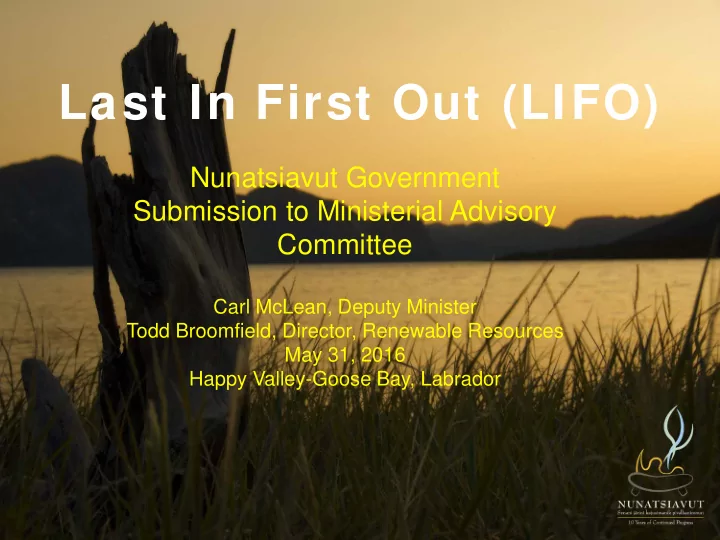

Last In First Out (LIFO) Nunatsiavut Government Submission to Ministerial Advisory Committee Carl McLean, Deputy Minister Todd Broomfield, Director, Renewable Resources May 31, 2016 Happy Valley-Goose Bay, Labrador
Labrador Inuit Land Claims Agreement • Labrador Inuit Land Claims Agreement (LILCA) was ratified in 2005. • Labrador Inuit ceded undefined rights to the Crown, for defined rights established in a modern land claim treaty. • The Nunatsiavut Government (NG) was established December 1, 2005 and replaced the Labrador Inuit Association (LIA).
Labrador Inuit Land Claims Agreement • Intended to provide for legal certainty and clarity of rights. • Land Claim Agreements are important for; ( Federal Framework for Modern Treaties) – Promoting strong and self reliant communities. – Improving social well-being and economic prosperity. – Providing certainty for resource development.
Labrador Inuit Land Claims Agreement • When implementing LILCA the federal departments must uphold the honour of the Crown, officials must act with honour, integrity and fairness when dealing with the NG. (OAG) • Obligations must be interpreted in a reasonable and purposive manner and not interpret them narrowly. (OAG)
Labrador Inuit Land Claims Agreement • Chapter 13 is the main chapter of LILCA related to the Commercial Fishery • Parts 13.12.7 and 13.12.9 address the sharing of shrimp in waters within and adjacent to the Zone. • The NG is entitled to a minimum of 11% of northern shrimp that is available in the zone and waters adjacent.
Labrador Inuit Land Claims Agreement • Waters Adjacent to the Zone" means those Canadian fisheries waters within the portions of Northwest Atlantic Fisheries Organization Divisions 2G, 2H and 2J adjoining and lying due eastward of the Zone”; (Part 1.1.1) • A portion of the Eastern Assessment Zone, SFA4, SFA5 and a portion of SFA 6 are directly within and adjacent to the Zone
Labrador Inuit and Northern Shrimp • Entered Northern shrimp fishery in SFA 5 in 1997, with a special allocation of 510T, increased by 750T and converted to a communal licence with a 1260T quota in 2003. • In 2014, DFO used LIFO and reduced us to 1043T, put back to 1260T in 2015. LILCA was ignored in 2014. • 1260T represents 5.4% of the overall quota in SFA 5.
Labrador Inuit and Northern Shrimp • Inshore affected cod fishers in southern Labrador and Northern Peninsula were given quota in 2003. • Nunatsiavut based fishers who were also cod affected received 0 quota. • We entered the shrimp fishery in SFA4 in 2012, 300T Special Allocation. No licence to fish this until 2014. • This 300T represents 2% of the overall quota in SFA 4.
Labrador Inuit and Northern Shrimp • There was an inshore quota established in 1998. This inshore quota has never been fished inshore. • SFA 4 quotas were increased in 2003, 2008, 2012 and 2013. The NG received none of these increases. • A 1700T quota was allocated to science in 2013. • Still, we only have 2% of the overall quota in SFA 4. • We have no quotas or allocations in the EAZ or SFA 6.
Management • Annual designations provided to Beneficiaries for SFA 4 and 5 • NG owns commercial communal shrimp licence with a combined quota of 1560T (300T SFA 4 1260T in SFA 5) • Both can be harvested on one licence. • Generally 13 Beneficiaries designated annually, with the ability to designate up to 14 • Direct employment to 40 beneficiaries annually
Nunatsiavut Interests Nunatsiavut based interests must have priority • consideration in the fishery within and adjacent to our waters. • Torngat Fish Producers Coop and the Nunatsiavut Group of Companies hold offshore shrimp licences. • Revenue from these licences are crucial to ensure the sustainability of the fish plants in Nain and Makkovik. • The fish plants in Nain and Makkovik are crucial to our snow crab, turbot and char fisheries. • These plants are an important economic driver in the communities and for Nunatsiavut as a whole.
LILCA and LIFO DFO land claim obligations overrule its policy • obligations, including LIFO when making decisions on northern shrimp in waters within and adjacent to our zone. Parts 13.12.7 and 13.12.9 of LILCA intended to • increase Labrador Inuit participation in the Northern shrimp fishery to a minimum of 11% of the quantity available to be harvested. • DFO decisions in the northern shrimp fishery has largely ignored the LILCA and deprived Labrador Inuit greater benefit from within and adjacent to our waters.
Current LIFO Policy • Disputes Canadas stated benefits for settling land claims and as a rule Land Claim obligations. • Does not ensure benefit to Labrador Inuit and runs counter to the principle of Honour the Crown.
Moving Forward • Land Claim Agreements are important for; ( Federal Framework for Modern Treaties) – Promoting strong and self reliant communities. – Improving social well-being and economic prosperity. – Providing certainty for resource development. • LIFO or replacement policy must; • Ensure LILCA takes priority in northern shrimp management decisions. • Uphold the honour of the Crown, ensure honour, integrity and fairness when making decisions. • Interpret LILCA provisions in a reasonable and purposive manner and not narrowly as in the past.
Moving Forward • LIFO or replacement policy must; • Ensure Labrador Inuit rights (aboriginal rights) take priority in waters within and adjacent to our settlement area. • Builds a new and more progressive relationship with Aboriginal people, including Labrador Inuit, based on mutual respect and trust. • Promotes investment and employment. • If we receive our fair share of shrimp (minimum 11%) we could consider a shrimp processing plant in Nunatsiavut.
Ministers Mandate Letter “It is time for a renewed, nation-to-nation relationship with Indigenous peoples, based on recognition of rights, respect, co- operation, and partnership”
Nakummek
Recommend
More recommend